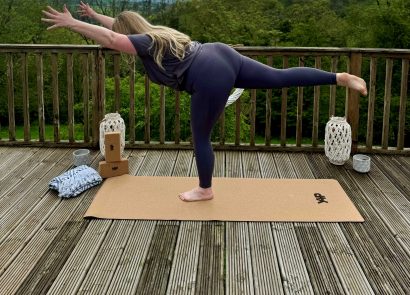Balancing your career, relationships and family commitments can often feel like a juggling act, but add in a cancer diagnosis, and life can feel like a completely different ballgame. According to Cancer Research UK, one in seven UK females will be diagnosed with breast cancer in their lifetime, which means that you’ll probably know at least one person who has been affected by the disease. But what happens after you’ve left the consultant’s room? Much of the awareness about breast cancer is centred around the prevention, the initial diagnosis and the treatment. What tends to gather less attention, is the fallout. Careers, self-esteem and relationships with family members and friends can, sometimes, take an irrevocable hit as treatment begins. We spoke to those whose lives cancer had affected and how they’ve coped.
Self-esteem
Looking in the mirror can feel very different after you go through treatment. Breast cancer can test the relationship you have, not just with your body, but with your sense of self. For Tessa Anderson (42), losing her hair was difficult, but she managed to remain positive. “Breast cancer has changed my outlook – I speak my mind a lot more now. I was nervous about hair loss, but once it started to come off I took the power back by getting my daughters to shave my head! I also had a mastectomy on my left side and no reconstruction. It’s surprised me how unaffected I am about having one breast. My husband isn’t upset by the changes to my body which massively helps. Meeting women like me on Breast Cancer Care and Breast Cancer Now’s Moving Forward course really helped, along with the valuable information I was given. I have always been a worrier but now I try to live in the moment more, enjoying precious time with my kids and family.” Tessa’s thoughts during this time are common, explains Dr Claire Scanlan, a clinical psychologist (breastcancerhaven.org.uk): “Often women describe breast cancer and the subsequent treatment as feeling like an attack on their femininity, which can change how they perceive themselves and their body. Local counselling and psychology services can be really helpful during this time.”
Relationships
Many breast cancer survivors find telling the people they love can feel as daunting as the diagnosis itself, as Dr Scanlan explains: “A cancer diagnosis introduces an enormous element of uncertainty. A partner can suddenly find themselves in a carer role which can affect the balance of, and power dynamics within, a relationship.” For Jane Allen (41), a single parent and busy marketer for a top UK design consultancy, the diagnosis came as a shock to her and her new partner. It was only when the lump started to enlarge that it was revealed that she had the rare form of triplenegative breast cancer. After her treatment, she started working with Breast Cancer UK: “I’d been seeing someone for three months when the diagnosis came about. I said I would understand if he would find it difficult to continue in the relationship. He told me ‘no, I don’t want to go anywhere’.” But it’s not only partners who can find coming to terms with the diagnosis difficult, as Jane reveals. “I’m very close with my daughter and we tell each other a lot. I remember after the diagnosis, I was driving along and she said ‘the biggest problem I’ve got mum, is that I talk to you about everything, and now I feel like I can’t because this is happening to you’.” Children cope differently when they find out about a diagnosis, but being open about the situation and to any questions that arise is the best way forward. “Children often feel worried and sad.
Sometimes they don’t want to be away from their parents, which is an example of regressive behaviour and is commonplace among children of all ages. Honesty and taking time to listen to their concerns are so important. It’s very easy for children to pick up on misinformation of things that they have overheard, or been told at school, so the best thing caregivers can do is provide them with accurate, age-appropriate information,” says Dr Scanlan.
Finances
Most employers offer Statutory Sick Pay (SSP) which can be paid for up to 28 weeks after the fourth consecutive day of a period of sickness from work. But if your absence is going to be longer than this, you may be entitled to claim some in-work sickness benefits from the government. For Amanda Mahoney (48), taking time off work impacted her not just financially, but mentally: “I worked in admin, as a teaching assistant and as an outreach worker for children with autism. Most managers were sympathetic at the time and other team members were able to cover the shared duties on days when I had appointments. While the team performance didn’t suffer in terms of delivering the service, I was aware that it didn’t help colleagues’ stress levels. That didn’t sit well with me. Requests needed to be approved by senior management and, on one occasion, I received a note telling me what time train and route to take to minimise the time I was out of the workplace.” Employers are obliged to support employees with cancer, says Ghazala Anjam, work support team leader (macmillan.org.uk). “If you have, or have had cancer, you are protected from unfair treatment at work under The Equality Act (2010) which applies as soon as someone is diagnosed, meaning that you cannot be treated less favourably because of your diagnosis. Under this law, your employer should try to support you, including making changes (known as reasonable adjustments) to your workplace or working arrangements.
How breast cancer affected me…
Kristin Hallenga, founder of Coppafeel @howtoglitteraturd
“I got diagnosed at 23 and for me, it was very much about, ‘right, how do I manage this?’. The harsh treatments meant my weight really fluctuated and then my left breast was removed. Losing my hair was all part of getting better, so it worked for me to see those changes as part of the process of fighting the disease. At CoppaFeel, we want people to start checking themselves when they’re younger, so our new campaign, Grab Life By The Boob, encompasses our attitude to the disease and to life. It can affect anyone and we wanted to spread awareness of that.”
Helen Addis, founder of #changeandcheck @thetittygritty
“I liken that initial diagnosis to when you first have children. You’re so used to having your own life, then everything changes. I found telling my family hard. They found it emotional. Every time I had to tell a loved one about my breast cancer, I’d relive it. But we were able to focus and get into fight mode. The ITV Lorraine ChangeAndCheck campaign is now in John Lewis, Oasis, Ted Baker, Monsoon, Asda and many independent places. Changing rooms are the perfect time to check! So far, I’ve had six women contact me to say they’ve had a cancer diagnosis from it.”
Louise Pentland, vlogger and author @louisepentland
“My darling mum died when I was seven, after a brave two-year battle with breast cancer. Her death taught us all to cherish every moment, even the dull and mundane because you never know how many moments you have left. Now I’m a mum, I tell my daughters regularly how much I love them and how special they are. I constantly want to fill them with everything I would ever want to say to them, just in case I don’t get to say anymore. Losing my mum has made our family love harder and louder and we’re grateful to her for that.”






















